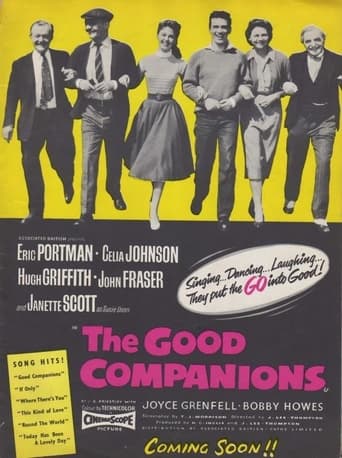malcolmgsw
If you have seen the original 1933 version of the Good Companions then you will understand why I say that this is a vastly inferior remake.True it is in colour,but if anything it detracts rather than adds to the film.In any event by the time this film was$ made concert parties had virtually died out.The two leads are very poor.Jeanette Scott cannot sing or dance which makes her appearance rather pointless.John Fraser is an inadequate leading man.The film differs from the original in a number of ways,all to its own disadvantage.There is the tacked on show at the end which is truly dreadful and represents all that is worst in fifties British musicals.So not surprising that in the final credits it is the dancers who take the top credits.Definitely not one of Associated British Pictures better efforts
writers_reign
In some aspects The Good Companions formed the basis of J.B. Priestly's pension pot given the number of outings it has enjoyed on the large and small screen since the first adaption in 1933. For me the drawing card for this, 1957, version was Celia Johnson as Miss Trant, the spinster who saves the Concert Party dying on its feet in their initial encounter and turns it around. On paper this story is the personification of simplistic as Priestly contrives to have three disparate people, a down-to-earth Yorkshire factory worker with a nagging wife, just rendered jobless even as an upper-class schoolteacher finds himself in the same boat, and the aforesaid spinster who realises simultaneously that life is for living, come together and collide with the Concert Party whose manager has just eloped with the takings and left them stranded. A plot as flimsy as this requires deft performances and here Eric Portman as the bluff Yorkshireman and Celia Johnson as the Home Counties lady of leisure are a delight. Janette Scott as the ingenue Susie Dean shares the screen if no actual scenes with real-life mother Thora Hird, as the nagging wife and Paddy Roberts, very much in vogue at the time, performing his own lyrics, provides a half-decent score. Worth a look.
drednm
The 1957 color film is a disappointment (no real surprise), an attempt to produce a big Hollywood musical when the story didn't call for one. The re-do keeps the basic story but loses all the heart and soul of the original film.Janette Scott (daughter of Thora Hird and a one-time wife of Mel Torme!) is a pallid replacement for the ethereal Jessie Matthews. John Fraser has the John Gielgud role. Celia Johnson has the Mary Glynne role, and Eric Portman the Edmund Gwenn. Others in the cast include Mona Washbourne, Bobby Howes, Rachel Roberts, Thora Hird, Anthony Newley, Hugh Griffith, Joyce Grenfell, Marjorie Rhodes, Fabia Drake, Shirley Anne Field, Beatrice Varley, Alec McCowan, John Le Mesurier and dancers Beryl Kaye, Paddy Stone, and Irving Davies.Most notable changes in plot include Miss Trant (Celia Johnson) not having a reunion with her one-time flame. The flame here is Joyce Grenfell pursuing the dancer Jerry (Paddy Stone), thus depriving the Trant character of any kind of development. The big night for Susie Dean (Janette Scott) is turned into a comic free-for-all, thus depriving the Dean character of the astonishing sequence enjoyed by Jessie Matthews of singing amid the debris (the show must go on). The finale instead is an interminable sequence of musical numbers that show Scott as a combination Debbie Reynolds/Connie Stevens without the singing or dancing talent (she's dubbed, and her dancing is pretty much limited to being hauled around by Stone and Davies).Eric Portman serves as a would-be love interest for Johnson, but of course he's married, so that's a dead end. John Fraser seems totally lost in the John Gielgud role of Inigo Jollifant (funny no one ever asks him to repeat his odd name). Most of the remainder have little to do.Then there's the usually dour Rachel Roberts who explodes in a solo number "The Gentleman Is a Heel." Who knew she could sing? The ever lovable Joyce Grenfell has a great scene with a cake. Her final line there is something like "Take this away, it's of no use now." When this came out in 1957, the original film had likely been unseen since 1933 so comparisons were unlikely. Taking that into consideration this was probably seen as a serviceable musical for the times, and definitely a star vehicle for 19-year-old Scott.Grenfell had hit stage show a few years earlier in London and New York. Cast members included the film's dancers: Irving Davies, Paddy Stone, and Beryl Kaye.
didi-5
This remake of the thirties Jessie Matthews/John Gielgud musical has a lot of charm due to its lovely colour, excellent songs, and a strong cast (good roles for Celia Johnson, Eric Portman, Joyce Grenfell, Hugh Griffith, Bobby Howes, Rachel Roberts, John Fraser and of course Jeanette Scott and her mother Thora Hird; smaller showy roles for Anthony Newley and John Le Mesurier). The last few musical numbers towards the end of the film match many of Hollywood musical efforts around the same time, but the fact that the film is British gives it a heart and a sense of fun sometimes lacking in American polish.


